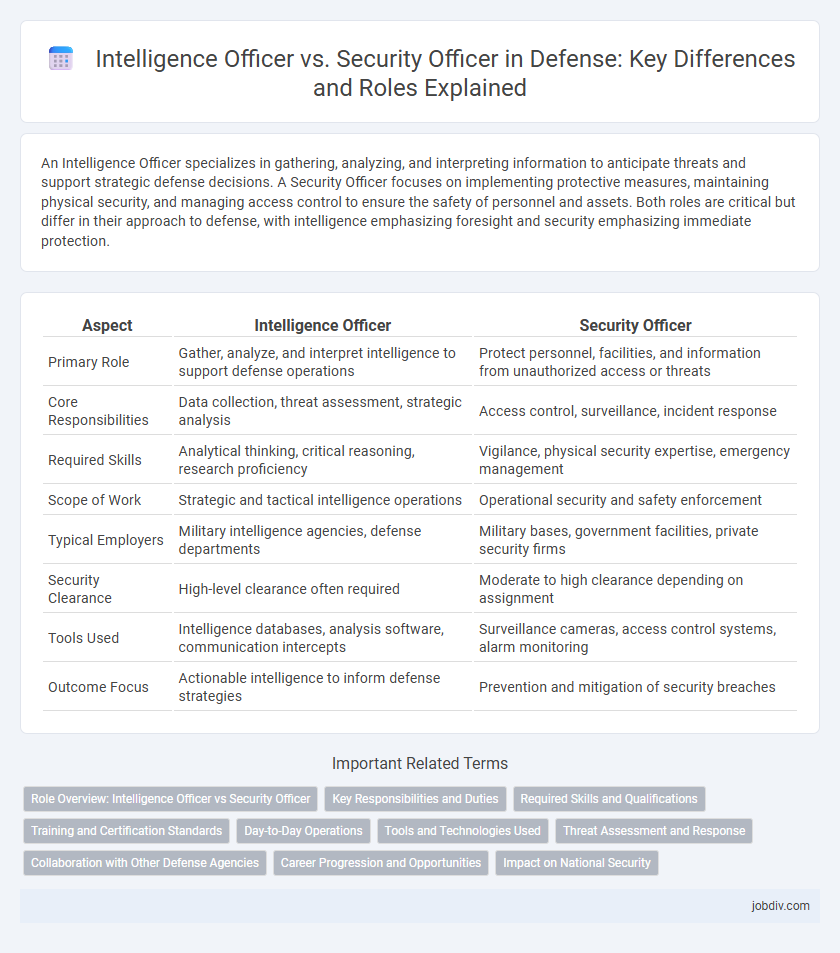An Intelligence Officer specializes in gathering, analyzing, and interpreting information to anticipate threats and support strategic defense decisions. A Security Officer focuses on implementing protective measures, maintaining physical security, and managing access control to ensure the safety of personnel and assets. Both roles are critical but differ in their approach to defense, with intelligence emphasizing foresight and security emphasizing immediate protection.
Table of Comparison
| Aspect | Intelligence Officer | Security Officer |
|---|---|---|
| Primary Role | Gather, analyze, and interpret intelligence to support defense operations | Protect personnel, facilities, and information from unauthorized access or threats |
| Core Responsibilities | Data collection, threat assessment, strategic analysis | Access control, surveillance, incident response |
| Required Skills | Analytical thinking, critical reasoning, research proficiency | Vigilance, physical security expertise, emergency management |
| Scope of Work | Strategic and tactical intelligence operations | Operational security and safety enforcement |
| Typical Employers | Military intelligence agencies, defense departments | Military bases, government facilities, private security firms |
| Security Clearance | High-level clearance often required | Moderate to high clearance depending on assignment |
| Tools Used | Intelligence databases, analysis software, communication intercepts | Surveillance cameras, access control systems, alarm monitoring |
| Outcome Focus | Actionable intelligence to inform defense strategies | Prevention and mitigation of security breaches |
Role Overview: Intelligence Officer vs Security Officer
Intelligence Officers specialize in gathering, analyzing, and interpreting information to support military operations and national security objectives, often working with classified data and surveillance technologies. Security Officers focus on protecting personnel, facilities, and sensitive information from threats such as espionage, sabotage, or physical attacks through access control, threat assessment, and enforcement of security protocols. Both roles are critical in defense but differ fundamentally in function: intelligence drives strategic decision-making, while security ensures operational protection.
Key Responsibilities and Duties
Intelligence Officers primarily gather, analyze, and distribute critical information to support military operations and strategic decision-making, focusing on threat assessment and enemy activity monitoring. Security Officers concentrate on safeguarding personnel, facilities, and classified information by enforcing security protocols, conducting risk assessments, and managing access controls. Both roles require vigilance and a deep understanding of operational security, but Intelligence Officers emphasize information analysis while Security Officers prioritize physical protection measures.
Required Skills and Qualifications
Intelligence Officers require advanced analytical skills, proficiency in data interpretation, and expertise in covert operations, often holding degrees in international relations, political science, or cybersecurity. Security Officers must possess strong observational abilities, risk assessment capabilities, and knowledge of physical security protocols, typically requiring certifications in security management or law enforcement experience. Both roles demand high ethical standards, effective communication skills, and the ability to operate under pressure within defense environments.
Training and Certification Standards
Intelligence Officers undergo rigorous training in data analysis, threat assessment, and covert operations with certifications such as Certified Defense Intelligence Professional (CDIP) enhancing their expertise. Security Officers receive specialized instruction in physical security, access control, and emergency response, often obtaining certifications like Certified Protection Professional (CPP) to validate their skills. The certification standards for Intelligence Officers emphasize analytical acumen and information gathering, whereas Security Officers focus on protective measures and risk management protocols.
Day-to-Day Operations
Intelligence Officers analyze classified data and generate actionable insights to support strategic defense decisions, often working with surveillance technology and human intelligence sources. Security Officers focus on protecting personnel, facilities, and information assets by implementing access control measures, conducting threat assessments, and managing emergency response protocols. Their day-to-day operations differ in scope, with Intelligence Officers emphasizing information gathering and analysis, while Security Officers prioritize physical security and risk mitigation.
Tools and Technologies Used
Intelligence Officers utilize advanced data analytics platforms, geospatial intelligence software, and signals intelligence (SIGINT) tools to gather and interpret information critical for strategic operations. Security Officers rely on surveillance systems, access control technologies, and cybersecurity protocols to protect assets and maintain operational security. Both roles integrate biometric systems and secure communication devices to enhance threat detection and response capabilities.
Threat Assessment and Response
Intelligence Officers specialize in gathering, analyzing, and interpreting data to identify potential threats, enabling proactive decision-making in defense operations. Security Officers focus on implementing protective measures and immediate responses to physical and cyber threats, ensuring operational integrity and personnel safety. Effective threat assessment in defense requires seamless coordination between intelligence analysis and security enforcement to mitigate risks swiftly and efficiently.
Collaboration with Other Defense Agencies
Intelligence Officers exchange critical threat assessments and strategic data with agencies such as the CIA, NSA, and FBI to enhance situational awareness and national security operations. Security Officers work closely with military police, homeland security, and counterintelligence units to implement protective measures and manage access controls across defense installations. Effective collaboration between Intelligence and Security Officers ensures comprehensive defense through integrated information sharing and coordinated risk mitigation efforts.
Career Progression and Opportunities
Intelligence Officers typically advance through specialized roles in data analysis, field operations, and strategic planning, often moving into leadership positions within military or government intelligence agencies. Security Officers focus on protecting assets and personnel, with career progression leading to senior security management, risk assessment, and compliance roles in defense or private sectors. Intelligence Officer careers offer broader opportunities in national security and covert operations, while Security Officers provide critical support roles emphasizing physical and cyber security enforcement.
Impact on National Security
Intelligence Officers gather and analyze critical information on threats, enabling proactive defense strategies that safeguard national security. Security Officers implement protective measures and enforce policies to prevent espionage, sabotage, and unauthorized access, directly mitigating risks to military assets and infrastructure. The combined efforts of both roles enhance situational awareness and operational readiness, strengthening a nation's defense posture.
Intelligence Officer vs Security Officer Infographic

 jobdiv.com
jobdiv.com